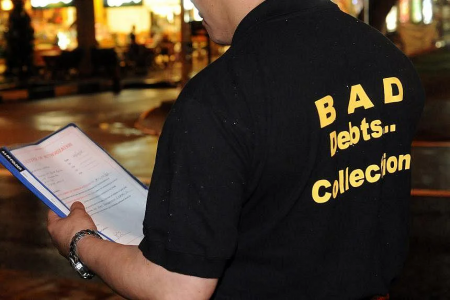New regulations to curb problematic debt collection conduct
Debt collectors who brandish a fist, threaten physical harm or put up notices with the personal information of debtors may be jailed and fined under new regulations.
The Debt Collection Bill, which was passed in Parliament on Tuesday, will regulate the debt collection industry with the aim to prevent problematic debt collection conduct.
Minister of State for Home Affairs Sun Xueling said the number of police reports made against the conduct of debt collection businesses and debt collectors have remained high - averaging 367 reports annually from 2018 to last year.
She spoke about two cases of debt collection that caused public alarm.
The first, in 2019, involved a debt collector who wore a traditional funeral outfit to the debtor's workplace while carrying a banner with the debtor's face.
The second, in 2016, involved six debt collectors who harassed a food stall in Funan Mall and damaged equipment at the stall.
The debt collectors in both instances were taken to task and convicted under existing laws.
Ms Sun said debt collection is a legitimate economic activity that facilitates the fulfilment of financial obligations, but more could be done to regulate the business.
"Individuals and businesses should not be subjected to debt collection methods that clearly exceed what may be considered reasonable pressure for payment, especially if these methods also affect the public's sense of safety and security," she said.
The Bill will regulate the industry, targeting in particular entities that collect debt from a debtor either on behalf of another person, or where the businesses themselves had acquired the debt, and their debt collectors.
Ms Sun said that the business models of such entities lend themselves to higher law and order risks.
Under the regime, all such debt collection businesses, including their key appointment holders and the debt collectors, will be screened by the police and must be assessed to be "fit and proper" before they are granted a licence or an approval.
Those who engage in behaviour that threatens the physical safety of the debtor, such as sending messages threatening physical harm, may be jailed for up to a year and fined up to $10,000.
The maximum penalties are doubled for repeat offenders.
Already-regulated businesses, such as licensed moneylenders and banks, pose lower law and order risk, said Ms Sun.
But they will also be subject to a class licensing scheme which does not involve screening by the police to determine if they are "fit and proper".
Several MPs had asked for clarification on what the screening process was and the parameters of what would be deemed "fit and proper".
Mr Louis Ng (Nee Soon GRC) said that the provisions for what would be considered by the licensing officer were broad, and asked for examples of what factors may be used to deem if a person is "fit and proper".
Mr Leon Perera (Aljunied GRC) said that the screening process might prevent existing individual debt collectors who have had some past involvement with the criminal justice system from obtaining the required licence, even though they have been exemplary in their current work performance.
Ms Sun said that prior offences, such as those involving harassment or violence, will be taken into account for screening.
She added that the considerations are similar to those used for security officers, and the licensing officer would also consider the severity of past offences, and the length of time passed since the commission of the offence.
Mr Perera also suggested that public education and awareness campaigns be conducted for members of the public to educate them on what would be considered unacceptable behaviour from debt collectors.
Ms Sun thanked the member for his suggestion and said it would be studied.
The regulations are expected to take effect next year, and sufficient time will be provided for existing debt collection businesses and debt collectors to transit into the new regimes.
Get The New Paper on your phone with the free TNP app. Download from the Apple App Store or Google Play Store now



